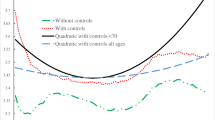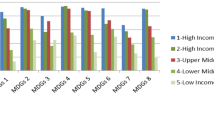Abstract
Quality-of-life in nations can be measured by how long and happy people live. This is assessed by combining data on life expectancy drawn from civil registration with survey data on subjective enjoyment of life as a whole. This measure of ‘apparent’ quality-of-life is a good alternative to current indexes of ‘assumed’ quality-of-life such as the Human Development Index. Data are available for 67 nations in the 1990s. The number of Happy-Life-Years varies considerably across nations. Switzerland is at the top with 63.0 years and Moldavia at the bottom with 20.5 years. China is in the middle with an average of 46.7. Happy lifetime has risen considerably in advanced nations over the last decade.People live longer and happier in nations characterised by economic affluence, freedom and justice. Together these three societal qualities explain 66% of the cross-national variance in Happy-Life-Years. Income equality and generous social security do not appear to be required for a long and happy life.
Similar content being viewed by others
References
J. Boelhouwer I. Stoop (1999) ‘Measuring well-being in the Netherlands’, Social Indicators Research 48 51–75
Dijkstra G.(2000). ‘A larger pie through a fair share? Gender equality and economic performance, Institute of Social Studies’, Working Paper no. 315, The Hague, The Netherlands.
Durkheim, E.: 1897, Le suicide: Etude de sociologie (Suicide, a sociological study) (Alcan, Paris).
R. Estes (1984) The Social Progress of Nations Preager New York, USA
M. Hagerty et al. (2001) ArticleTitle‘Quality of Life indexes for national policy: Review and agenda for research’ Social Indicators research 55 1–96 Occurrence Handle10.1023/A:1010811312332
Heritage Foundation: 1999, ‘Index of economic freedom’ Internet: www.heritage.org
InstitutionalAuthorNameILO (1997) The Costs of Social Security: 15th International Inquiry 1990–1993 International Labor Organization Geneva, Switzerland
InstitutionalAuthorNameIMF (2000) World Economic Outlook October 2000 International Monetary Fund Washington, USA
K Keniston (1968) Young Radicals: Notes on Committed Youth Harcourt New York
E.R. Messick (1996) World Survey of Economic Freedom 1995–1996 Freedom House/ Transaction Publishers London, UK
W.N. Morris (1992) ‘A functional analysis of the role of mood in affective systems’ M.S. Clark (Eds) ‘Emotion’ Review of Personality and Social Psychology nr 13. Sage New York
D. Seedhouse (1986) Health: The Foundations for Achievement Wiley Chichester, UK
Transparency International: 1995, TI Corruption Index. Press release, 15 June 1995, Transparency International, Berlin.
InstitutionalAuthorNameUN (1995) Demographic Yearbook 1993 United Nations New York
InstitutionalAuthorNameUNPD (1995) Human Development Report 1995,United Nations Development Program Oxford University Press New York USA
InstitutionalAuthorNameUNPD (2001) Human Development Report 2001 United Nations Development Program,Oxford University Press New York USA
R. Veenhoven (1984) Conditions of Happiness Reidel Dordrecht
R. Veenhoven (1991) ArticleTitleIs happiness relative?’ Social Indicators Research 24 1–34 Occurrence Handle10.1007/BF00292648
R. Veenhoven (1995) ArticleTitle‘The cross-national pattern of happiness, Tests of predictions implied in three theories of happiness’ Social Indicators Research 34 33–68 Occurrence Handle10.1007/BF01078967
R. Veenhoven (1996) ArticleTitle‘Happy life-expectancy: A comprehensive measure of quality-of-life in Nations’ Social Indicators Research 39 1–58 Occurrence Handle10.1007/BF00300831
R. Veenhoven (1999) ArticleTitle‘Quality-of-life in individualistic society: A comparison of 43 Nations in the early 1990s’ Social Indicators Research 48 157–186 Occurrence Handle10.1023/A:1006923418502
R. Veenhoven (2000a) ArticleTitle‘The four qualities of life: ordering concepts and measures of the good life’ Journal of Happiness Studies 1 IssueID1 1–39 Occurrence Handle10.1023/A:1010072010360
Veenhoven R. (2000b) ‘Freedom and happiness: A comparative study in 44 nations in the early 1990s’, in E. Diener , E. M. Suh (eds.), Culture and Subjective Wellbeing (MIT press, Cambridge, MA) USA, 2000, ISBN 0 262 04182 0:257–288.
R. Veenhoven (2000c) ArticleTitle‘Well-being in the welfare state: Level not higher, distribution not more equitable’ Journal of Comparative Policy Analysis 2000 IssueID2 91–125 Occurrence Handle10.1023/A:1010058615425
Veenhoven, R.: 2002, ‘Return of inequality in modern society? Test by dispersion of life-satisfaction across time and nations’. Paper presented at the ISA conference, Brisbane Australia July 2002.
InstitutionalAuthorNameWHO (2001) The World Health Report 2001 World Health Organization Geneva ,Switzerland
WDH: 2003, World Database of Happiness. Continuous Register of Research on Subjective Appreciation of Life. Version 2003. Erasmus University Rotterdam, Internet: http://www.eur.nl/fsw/research/ happiness
J.A. Ziegler C.R. Britton (1981) ArticleTitle‘A comparative analysis of socio-economic variations in measuring the quality of life’ Social Science Quarterly. 62 303–312
Author information
Authors and Affiliations
Corresponding author
Rights and permissions
About this article
Cite this article
Veenhoven, R. Apparent Quality-of-Life in Nations: How Long and Happy People Live. Soc Indic Res 71, 61–86 (2005). https://doi.org/10.1007/s11205-004-8014-2
Accepted:
Issue Date:
DOI: https://doi.org/10.1007/s11205-004-8014-2




